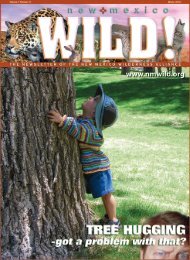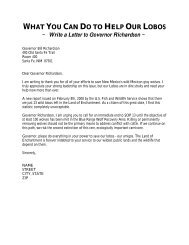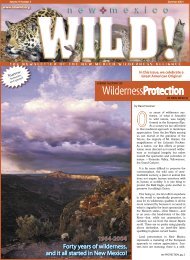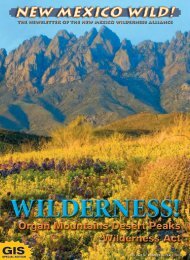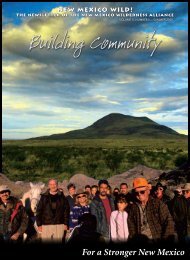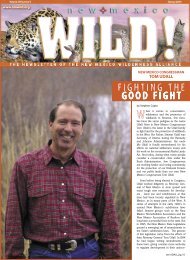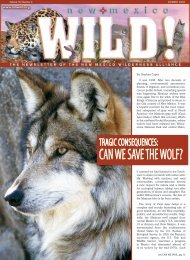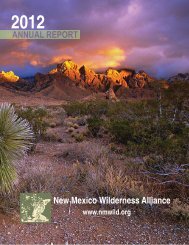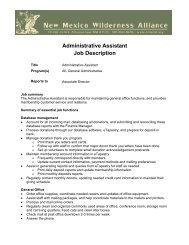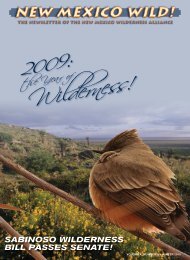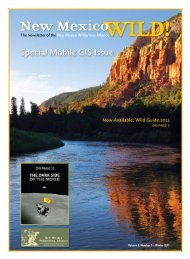Summer 2010 Newsletter - New Mexico Wilderness Alliance
Summer 2010 Newsletter - New Mexico Wilderness Alliance
Summer 2010 Newsletter - New Mexico Wilderness Alliance
You also want an ePaper? Increase the reach of your titles
YUMPU automatically turns print PDFs into web optimized ePapers that Google loves.
Page 4 SUMMER-FALL <strong>2010</strong><br />
<strong>New</strong> <strong>Mexico</strong> WILD! • www.NMWild.org Page 5<br />
Securing America While Protecting<br />
Public Lands—An Exercise<br />
in Collaboration and Cooperation<br />
No More <strong>Wilderness</strong> Excuses<br />
by Ron Colburn<br />
In consideration of the markup of S. 1689,<br />
the “Organ MountainsDesert Peaks<br />
<strong>Wilderness</strong> Act,” a bill to be considered<br />
before the U.S. Senate, I want to<br />
commend Senators Bingaman and Udall<br />
for their efforts to forge legislation that<br />
works to protect both our international<br />
border with <strong>Mexico</strong> and our nationally<br />
valuable wilderness resources.<br />
This bill is clearly the end product of many<br />
hours of consultative work, numerous<br />
meetings, and the collaborative efforts<br />
of those who legislate, those who protect<br />
our precious, publicly stewarded lands,<br />
and those who ultimately protect the<br />
homeland. It is apparent to me that<br />
the people—our American public, that<br />
is—have been the sounding board for<br />
the intended positive outcomes of S.<br />
1689, and all walks, “both sides of the<br />
fence”—no pun intended—have been<br />
consulted, including the ranching and<br />
agricultural community; environmental<br />
and wildlife conservationist nongovernmental<br />
organizations (NGOs), and staunch<br />
supporters of protection of our borders<br />
and enforcement of our land’s laws.<br />
I have been reflecting recently on the<br />
progression of public and interagency<br />
collaboration and cooperation that I have<br />
witnessed during a decade and more of<br />
this kind of much-needed dialogue. During<br />
the past thirty-one years, I have served as<br />
a member of the federal law enforcement<br />
community tasked with protecting<br />
America at its sovereign frontiers. I have<br />
learned much from my partners in land<br />
stewardship, such as the Department of<br />
Interior’s Bureau of Land Management,<br />
the National Park Service, the U.S. Fish<br />
and Wildlife Service, along with the U.S.<br />
Forest Service of the Department of<br />
Agriculture. Most important, I learned<br />
that when we all worked together<br />
constructively, we were able to get<br />
things done and serve our country well.<br />
In reviewing the proposed legislation,<br />
and its most recent amendment (s), I<br />
am pleased to see how the leaders of<br />
the various entities have recognized<br />
the shared interests and even parallel,<br />
shared missions of protecting public<br />
lands while protecting the borderlands.<br />
While it is not a perfect world,<br />
and pleasing everyone all the time is<br />
improbable, I can see the “stretch” that<br />
leaders are making, in order to do more<br />
to understand each other’s missions.<br />
The unintended clash of our federal laws<br />
has proven at times to be a challenge over<br />
the past couple of decades. The National<br />
Environmental Policy Act, the Endangered<br />
Species Act, and the <strong>Wilderness</strong> Act<br />
have governed, to varying degrees, how<br />
federal agencies conduct their missions<br />
on public lands and federally owned<br />
lands. Whether it is a U.S. military base<br />
or a strip of road along the border with<br />
<strong>Mexico</strong> or Canada, these laws apply.<br />
We also must uphold the Immigration and<br />
Nationality Act, the U.S. code of criminal<br />
conduct, customs laws pertaining to<br />
tariffs and trade, drug enforcement laws,<br />
weapons trafficking laws, counterterrorism<br />
laws, and the Homeland Security<br />
Act. At times, these national priorities can<br />
come into conflict, and it is incumbent<br />
on leadership in these<br />
agencies, back in DC<br />
and on the ground,<br />
to coordinate and<br />
collaborate in order both<br />
to secure the border and<br />
protect our treasured<br />
natural resources.<br />
When I began to meet<br />
frequently with our<br />
partners from state and<br />
federal land management<br />
entities in the late 1990s,<br />
I served as a representative<br />
of the Department<br />
of Justice and later the<br />
Department of Homeland<br />
Security. I am now retired,<br />
and in retirement find an<br />
interest in continuing the<br />
necessary public dialogue<br />
and supporting ongoing interagency<br />
collaboration. I am happy to borrow a<br />
quote from a top-level border security<br />
executive who in part recently stated:<br />
With regard to … concern for Senate<br />
Bill 1689, the Organ MountainsDesert<br />
Peaks <strong>Wilderness</strong> Act, please know that<br />
Senator Jeff Bingaman’s staff made<br />
significant efforts to incorporate the needs<br />
of the Border Patrol and national security<br />
into the maps and verbiage associated<br />
with the bill. We believe that it is now<br />
crafted in such a way as to allow good<br />
visibility of the border and installation<br />
of technology and tactical infrastructure<br />
where needed proximal to the border.<br />
“Collaboration” and “cooperation” are<br />
two words that I rely on heavily when it<br />
comes to protecting America, and they<br />
are especially applicable in regards to<br />
the great debates on wilderness versus<br />
non-wilderness restrictions at and near<br />
the borderlands. I am pleased to have<br />
observed the missions of the individual<br />
agencies evolve over the years, as they<br />
recognize where their interests actually<br />
meet and even overlap in some places.<br />
I am proud of the fact that I played a<br />
leadership role in drafting the national<br />
Memorandum of Understanding between<br />
the Department of Interior, the Department<br />
of Agriculture, and the Department of<br />
Homeland Security, which was signed in<br />
2006. This document has since served as<br />
the baseline for interagency cooperation<br />
among those departments. It took us<br />
over two years to hammer out that<br />
Memorandum, and, while it hasn’t pleased<br />
everyone all the time, it has been essential<br />
in working out the tough challenges in<br />
effectively administering our nation’s laws.<br />
To deter illicit cross-border trafficking is to<br />
deter environmental degradation—it’s as<br />
simple as that, in many instances. There<br />
are many miles of publicly stewarded<br />
lands that are abutted by and are adjacent<br />
to the international boundary of the United<br />
States. In Arizona alone, where I served<br />
as a Chief Patrol Agent, one can find<br />
national monuments, national wildlife<br />
refuges, Native American tribal lands,<br />
U.S. military training ranges and bases,<br />
federally protected riparian areas, water<br />
boundaries, federally leased farmlands,<br />
and U.S. forest lands. Over 90 percent<br />
of the sector in which I served as Chief,<br />
the Yuma Sector, contained federally<br />
stewarded lands along the border.<br />
In order to accomplish this dual task, we<br />
need to keep in mind the importance of<br />
“access” and “balance.” In short, the U.S.<br />
Border Patrol needs access to the borderlands<br />
and beyond to protect the American<br />
people, infrastructure, and public lands.<br />
Section 287 of the Immigration and Nationality<br />
Act provides language allowing law<br />
enforcers to go anywhere, within twentyfive<br />
miles of the border, in the conduct of<br />
their duties. In turn, this must be balanced<br />
with the <strong>Wilderness</strong> Act requirements that<br />
prohibit motorized vehicular access on<br />
certain lands along and near the border,<br />
which can be challenging to national<br />
security needs, if not addressed in a deliberate,<br />
intelligent, and cooperative manner.<br />
There can be no compromise in securing<br />
America against those who would do<br />
us harm. But commonsense solutions<br />
can be achieved. I believe that the<br />
collaborative process can produce<br />
righteous outcomes in protecting<br />
America while also protecting our<br />
pristine wildlands. In my opinion, S.1689<br />
demonstrates that this can be done.<br />
There may be times where <strong>Wilderness</strong><br />
designation is not the best pathway. Many<br />
of these lands are already well protected<br />
by federal regulations yet still provide<br />
access to our ranchers, sportsmen, hikers,<br />
and law enforcement. The one group<br />
that absolutely does not respect laws<br />
or the lands that the laws are designed<br />
to protect is the criminal element—the<br />
cross-border traffickers; the smugglers.<br />
They will do whatever it takes to further<br />
their criminal schemes; deterioration<br />
of public lands and resources does not<br />
enter their equations. In this, we can be<br />
united, and in this we can find balance.<br />
I look forward to further pursuit of this<br />
noble cause: the interagency process of<br />
collaboration and cooperation achieving<br />
access and balance in securing our<br />
border and our natural heritage.<br />
Note: Ron Colburn is the former national<br />
Deputy Chief of the U.S. Border Patrol;<br />
he retired in November 2009 after over<br />
thirty-one years of service. He represents<br />
the third of four generations in his<br />
family who chose a career in protecting<br />
America’s borders. He also served<br />
as the Director for Law Enforcement,<br />
Homeland Security Council, Executive<br />
Office of the President, the White<br />
House. He now serves as a consultant<br />
with the Command Consulting Group,<br />
Washington, DC. He resides in Arizona.<br />
By Don Paterson<br />
It has been five years since the debate<br />
about wilderness in Doña Ana County<br />
began in earnest. These discussions<br />
have taken many twists and turns over<br />
the years but, thankfully, have resulted<br />
in the development of a sound and<br />
widely-supported proposal for protecting<br />
sensitive wildands in our community. As a<br />
wilderness supporter, I have been proud to<br />
participate in a diverse coalition of organizations<br />
and citizens who have fought for<br />
the central vision of protecting the Organ<br />
Mountains and nearby public lands. There<br />
has been a lot of information disseminated<br />
to the public recently with regard to the<br />
Organ Mountains - Desert Peaks legislation<br />
sponsored by Senators Bingaman<br />
and Udall—sadly, some has been<br />
intentionally misleading and misguided<br />
at best. Given this deluge of conflicting<br />
views, it would be understandable if many<br />
folks are confused about the “real story.”<br />
I am writing to address key facts about<br />
the legislation, S. 1689, specifically<br />
comments made in recent op-eds talking<br />
about border security and wilderness.<br />
Since the beginning of this debate,<br />
wilderness opponents have used every<br />
excuse in the book to fight any wilderness<br />
protection in our county. Now, even as<br />
the head of the U.S. Customs and Border<br />
Protection has issued a letter stating<br />
that the Organ Mountains – Desert<br />
Peaks <strong>Wilderness</strong> Act would enhance the<br />
security on our border, the fear tactics<br />
continue. It’s time that we understand<br />
the real facts about this bill, as well as<br />
about the agenda and history of those that<br />
have opposed all wilderness protection<br />
in this county from the beginning.<br />
Border Facts<br />
First off, it’s vitally important that Doña<br />
Ana County residents be presented<br />
with a few basic facts about the border.<br />
The most important is that we have<br />
relatively little illegal immigration that<br />
occurs in the county and, specifically,<br />
very little that entails crossing the<br />
Potrillo Mountains, one of the proposed<br />
wilderness areas. This has been<br />
repeatedly established by the Border<br />
Patrol. The landscape is very rugged<br />
and unforgiving and there is no water.<br />
Secondly, the Potrillo Mountains are<br />
already a <strong>Wilderness</strong> Study Area (WSA)<br />
and, as such, have been managed as if a<br />
wilderness area since 1980. This designation<br />
and the area’s management have<br />
never been stated to be a detriment to<br />
our border security by either the ranchers<br />
or the Border Patrol. Only after every<br />
other argument failed, are the wilderness<br />
opponents trying to fabricate this concern.<br />
Finally, according to the head of Border<br />
Patrol, the Organ Mountains – Desert<br />
Peaks <strong>Wilderness</strong> Act will actually improve<br />
our border security. Even though the<br />
Potrillo Mountains are a vast and pristine<br />
ecosystem—not easily crossed by illegal<br />
immigrants or drug smugglers, Senators<br />
Bingaman and Udall have taken the extra<br />
step of creating a security zone along their<br />
southern border that the Commissioner for<br />
U.S. Customs and Border Protection, Alan<br />
Bersin, calls an “enhancement” to the<br />
Border Patrol’s current ability to monitor<br />
this area. In plain speak, Commissioner<br />
Bersin’s comments mean that, if we<br />
pass the Organ Mountains – Desert<br />
Peaks <strong>Wilderness</strong> Act, we are actually<br />
improving our current border security. If<br />
we don’t pass this bill, we are allowing the<br />
objections of an extreme ideological few,<br />
like Mr. Cooper, to undermine and prevent<br />
this enhancement to our border security.<br />
Fear Tactics<br />
Since the Border Patrol has said the Organ<br />
Mountains – Desert Peaks <strong>Wilderness</strong> Act<br />
will improve our border security, why are<br />
the opponents of this legislation still trying<br />
to convince us it will lead to mayhem? As<br />
the old saying goes, “consider the source.”<br />
Recently, at several forums, wilderness<br />
opponents stated flatly that “we should<br />
not have any protected lands within 100<br />
miles of the border.” If such a ridiculous<br />
one size fits all policy were enacted,<br />
our country would immediately have to<br />
close White Sands National Monument,<br />
the Gila <strong>Wilderness</strong>, Big Bend National<br />
Park, and the Guadalupe Mountains<br />
National Park. Have you heard about any<br />
of these places being illegal immigration<br />
or drug smuggling corridors? Given<br />
this radical position of local wilderness<br />
opponents, no form of protection of the<br />
Potrillo Mountains would satisfy their<br />
extreme argument short of defeating this<br />
legislation in its entirety. Of course, this<br />
is the ultimate goal of this fear tactic.<br />
A History of Excuses<br />
The wilderness opponents’ organization,<br />
People for Preserving Our Western<br />
Heritage (PFPOWH), had a very different<br />
tone for much of this five-year debate.<br />
For most of this time, their total<br />
opposition to wilderness was<br />
reflected in their proposed plan to<br />
REMOVE wilderness protections from<br />
EVERY <strong>Wilderness</strong> Study Area in Doña<br />
Ana County including in the Organ<br />
Mountains. Their plan also mandated<br />
a SELL-OFF of 65,000 acres of land<br />
for “community growth.” PFPOWH’s<br />
main partner at the time, the Las<br />
Cruces 4 Wheel Drive Club, even<br />
went so far as to publish a list of<br />
all the reasons wilderness was bad<br />
for our county, stating comically<br />
that “we don’t need wilderness on<br />
both sides of our community.”<br />
For their part, People for Western<br />
Heritage also published their own<br />
anti-wilderness laundry list, with<br />
one item ironically saying the Organ<br />
Mountains and local public lands didn’t<br />
measure up to “pure wilderness.”<br />
Incredibly, they contradicted themselves<br />
by both criticizing wilderness as being<br />
too restrictive on ranchers while<br />
simultaneously saying, “if only these<br />
areas were bigger and had fewer roads,<br />
we would support it.” We see this same<br />
disingenuous double speak today.<br />
In what can only be called a revolving<br />
door of excuses to oppose wilderness,<br />
it was only relatively recently that<br />
wilderness opponents have tried to settle<br />
on border security as their Trojan horse<br />
to stop wilderness protection for the<br />
Organ Mountains, Potrillos, and other<br />
important public lands. Like the other<br />
arguments before it, we should not buy it.<br />
A Story of Compromise<br />
Since the beginning of this wilderness<br />
protection effort, middle ground has been<br />
sought, concessions have been made,<br />
and compromises have been achieved.<br />
Important agreements were reached with<br />
sportsmen regarding roads and access<br />
throughout the protected lands. Compromises<br />
were made and a subsequent<br />
agreement was reached with the former<br />
Las Cruces Homebuilders Association<br />
Board of Directors that their press release<br />
at the time called “historic.” Through<br />
Senators Bingaman and Udall, extensive<br />
outreach, collaboration, and compromises<br />
were reached involving everything from<br />
flood control to power and gas lines.<br />
Back in 2006, every single affected<br />
rancher was also reached out by<br />
wilderness proponents. Instead of<br />
responding to that outstretched hand,<br />
opposing ranchers and off-roaders called<br />
wilderness supporters “eco-terrorists”<br />
and attempted to spread the same<br />
malicious and unfounded innuendo about<br />
our support for wilderness designation<br />
that they are now spreading about<br />
border security. Their choice then,<br />
as it is now, was to fight and to call<br />
people names. In spite of their often<br />
belligerent behavior, Senator Bingaman’s<br />
staff spent countless hours with<br />
each rancher talking about their needs<br />
and, most times, making adjustments<br />
to the legislation to accommodate their<br />
expressed concerns. In total, the Senators<br />
removed miles and miles of ranching<br />
infrastructure from the bill, even though<br />
wilderness designation would not have<br />
impacted or impaired their operations.<br />
Closing Thought<br />
I wholeheartedly agree that it would be<br />
nice if all the stakeholders in Doña Ana<br />
County were in complete agreement with<br />
each other on every single issue, but<br />
that is not reality. We cannot control<br />
the behavior of others, particularly of<br />
those who have made an ironclad bond<br />
to fight any and all wilderness legislation.<br />
The vast majority of stakeholders are<br />
in consensus supporting this important<br />
legislation, and recent polling shows that<br />
a very high majority of local residents<br />
are comfortable with the proposal.<br />
By any standard, this is as high a<br />
threshold of support as any wilderness<br />
bill passed across our great country,<br />
I am proud to say this has been an<br />
incredibly inclusive process that has<br />
brought about important compromises<br />
and historic legislation. <strong>Wilderness</strong> will<br />
be one of Doña Ana County’s best and<br />
most enduring legacies. As for border<br />
security, this bill will make things better.<br />
Don’t take my word for it, listen to the<br />
words of the Border Patrol’s leadership<br />
and local staff: “The provisions in this<br />
bill would significantly enhance the<br />
flexibility of the U.S. Customs and Border<br />
Protection (CBP) to operate in this border<br />
area” – Alan Bersin, Commissioner of the<br />
U.S. Customs and Border Protection.<br />
It’s time we move beyond the revolving<br />
door of excuses and fear, and all get<br />
behind this historic legislation.<br />
Don Patterson, Vice-President of Back<br />
Country Horsemen of America, Lower<br />
Rio Grande Chapter. Mr. Patterson<br />
has been a registered Republican<br />
since President Eisenhower.



